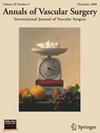A Greener Vascular Surgery: A Survey of Current Green Practices
IF 1.4
4区 医学
Q3 PERIPHERAL VASCULAR DISEASE
引用次数: 0
Abstract
Background
Climate change is an environmental emergency. With health care systems contributing to 5% of carbon emissions globally, environmental sustainability is an important consideration when delivering surgical services. This survey aimed to understand current green practices across vascular centers.
Methods
A survey on routine sustainable practices and the feasibility of implementing greener practices was developed between the Vascular and Endovascular Research Network and the Vascular Society of Great Britain and Ireland. The survey was delivered using the Qualtrics online survey tool and distributed through mailing lists and social media. The survey was open to completion by all vascular health care professionals internationally. Responses were collected between June 2, 2023, and September 15, 2023.
Results
A total of 115 vascular health care professionals across 14 different countries responded. Disposable theater materials were used in 85% (98/115) of respondents' centers. Most centers used electronic patient records (investigation requests [76%, 85/112], observation charts [81%; 91/112], prescriptions [74%; 83/112]). Paper recycling policies were available in 52% (58/112) of respondents' centers. All the respondents agreed that vascular surgery can be greener. 80% (92/115) of respondents reported environmental sustainability was never discussed in departmental meetings and 24% (28/115) reported their department engaged with management to implement more sustainable practices. Barriers to change included finance (77%, 89/115), competing priorities (84%, 97/115), and lack of engagement (82%, 94/115).
Conclusion
This survey identified areas where vascular services could be more environmentally friendly, including reducing the use of disposable materials and improving recycling. Vascular health professionals are largely supportive of implementing changes to reduce the carbon footprint.
求助全文
约1分钟内获得全文
求助全文
来源期刊
CiteScore
3.00
自引率
13.30%
发文量
603
审稿时长
50 days
期刊介绍:
Annals of Vascular Surgery, published eight times a year, invites original manuscripts reporting clinical and experimental work in vascular surgery for peer review. Articles may be submitted for the following sections of the journal:
Clinical Research (reports of clinical series, new drug or medical device trials)
Basic Science Research (new investigations, experimental work)
Case Reports (reports on a limited series of patients)
General Reviews (scholarly review of the existing literature on a relevant topic)
Developments in Endovascular and Endoscopic Surgery
Selected Techniques (technical maneuvers)
Historical Notes (interesting vignettes from the early days of vascular surgery)
Editorials/Correspondence

 求助内容:
求助内容: 应助结果提醒方式:
应助结果提醒方式:


